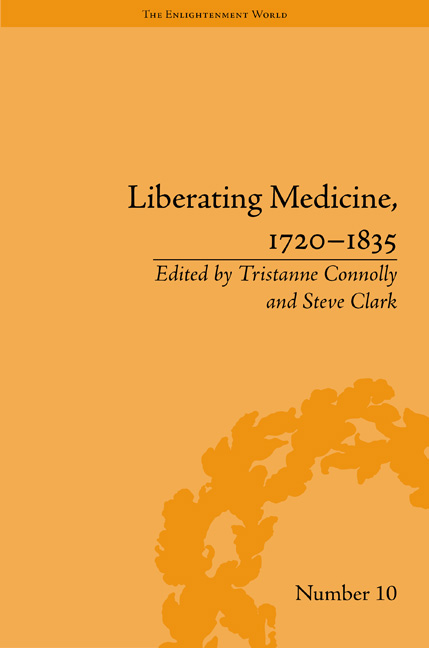Book contents
- Frontmatter
- CONTENTS
- Acknowledgements
- Contributors
- List of Figures
- Introduction
- I Spiritual Sickness and Hypochondria
- II Health and Emancipation
- III Madness
- 8 ‘In sickness, despair, and in agony’: Imagining the King's Illness, 1788–1789
- 9 Disembodied Souls and Exemplary Narratives: James Hogg and Popular Medical Literature
- 10 Idiotic Associations: Wordsworth and Nineteenth-Century Discourses on Idiocy
- IV Anatomized and Aestheticized Bodies
- V Birth
- Notes
- Works Cited
- Index
9 - Disembodied Souls and Exemplary Narratives: James Hogg and Popular Medical Literature
from III - Madness
- Frontmatter
- CONTENTS
- Acknowledgements
- Contributors
- List of Figures
- Introduction
- I Spiritual Sickness and Hypochondria
- II Health and Emancipation
- III Madness
- 8 ‘In sickness, despair, and in agony’: Imagining the King's Illness, 1788–1789
- 9 Disembodied Souls and Exemplary Narratives: James Hogg and Popular Medical Literature
- 10 Idiotic Associations: Wordsworth and Nineteenth-Century Discourses on Idiocy
- IV Anatomized and Aestheticized Bodies
- V Birth
- Notes
- Works Cited
- Index
Summary
Shepherd. That's a truth. In the ancient warld, was na there but ae God for poetry, music, and medishin? and the ancients, tak ma word for't, saw far intill the mysterious connexions o’ things in nature. Owre mony folk noo-a-days, forgets that the alliance atween sowle and body's stricker – though no unlike it – than that atween church and state. Let doctors learn a’ they can o’ baith – and hoo they are to do that without leeterature, philosophy, and poetry, as weel's as anatomy and mere medishin, surpasses my comprehenshun. Some doctors practeeze by a sort o’ natural rumblegumshun, without ony knowledge either o’ leeterature or ony thing else; and that accounts for some itherwise unaccountable kirkyards.
The credence granted to the powerful reciprocal relationship between mind and body in the early nineteenth century encouraged careful analysis of moral, i.e. non-physical, factors in diagnosis and treatment. Evidence gathered from the patient's narrative was balanced with that gained from physical examination. In the above excerpt from the ‘Noctes Ambrosianae’ dialogues, the Shepherd, the ‘Noctes’ alter-ego of James Hogg (1770–1835), advocates narrative competence in medical practice through the study of the fine arts. The ‘Noctes’ were a series of dialogues written primarily by John Wilson (1785–1854) and John Gibson Lockhart (1794–1854) for Blackwood's Edinburgh Magazine between 1822 and 1835, and the series exemplifies the dialogic exchange, beyond modern concepts of disciplinarity, promoted by this literary magazine. Within the catalytic chaos of the Edinburgh periodical press, the connection between published and private selves was, however, perhaps as mysterious as that between the body and the soul. The Shepherd makes this speech in honour of the singular appearance of two physician-writers: the Modern Pythagorean and Delta. The Modern Pythagorean was the Blackwoodian and later Fraserian pen-name of the Glaswegian surgeon, Robert Macnish (1802–37). His playful use of the ancient Pythagorean doctrine of metempsychosis, or transmigration of souls, within his first contribution to Blackwood's in 1826 earned him this title. D. M. Moir, pen-named Delta (1798–1851), is best known for his serialized novel, The Autobiography of Mansie Wauch, collected together in 1828.
- Type
- Chapter
- Information
- Liberating Medicine, 1720–1835 , pp. 127 - 140Publisher: Pickering & ChattoFirst published in: 2014



